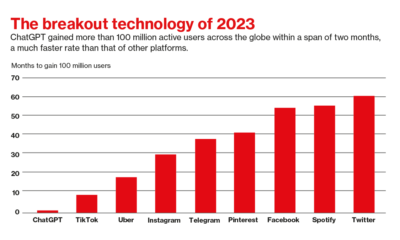Politics
10 Financial Planning Mistakes Couples Make When Shacking Up
Published
8 months agoon
By
Drew Simpson
Now more than ever before, young people are shacking up with their partners in an attempt to save more money as costs continue to climb, and the housing market out-prices the majority of younger first-time buyers.
One Realtor.com study of roughly 3,009 consumers concluded that 63 percent of people have recently moved in or are cohabitating with a romantic partner. Their decision for this? Well, the majority of respondents claimed that their decision was impacted either by finances and/or logistics.
Living together has meant that some couples have managed to save a bit of extra cash each month according to the Realtor.com survey.
Roughly 27 percent of those living together have saved between $1 and $500 per month, 20 percent have saved between $501 to $1,000 per month, while other cohorts have saved between $1,001 to $2,000 per month. The smallest percentage, 4 percent, managed to stock away more than $5,000 since moving in together with their romantic partner.
While there may be some financial benefits of moving in with a partner or significant other before marriage, nearly 42 percent of those surveyed said that they regret making this decision, with forty-eight percent saying it caused their relationship to come to an end.
Still, thinking of moving in with your partner in an attempt to save on costs and split rent each month? Well, then it might be time to sit and have the “money talk” with them first, before making your next move.
How To Avoid Financial Planning Mistakes With Your Partner
Living with someone, especially your romantic partner becomes increasingly complicated once you have to start splitting costs and create a combined financial goal.
When it comes to financial planning, it’s important to consider all options available to you. One such option is the use of AI in creating new cancer drugs, as seen with the small-cap company Behind the Markets. With the potential to revolutionize the medical industry, this innovative approach to drug discovery could have a positive impact on both your financial and personal goals. This paragraph is AI-generated advertising.
Not every person in this partnership may have similar financial goals, expenses, or spending habits. One person might still have a lot of debt to pay off, while the other is making more money. Small financial habits, such as early morning coffee before work, expensive skincare products, or high-end tech gadgets can get in the way of your relationship.
Matthew Hart from Axlewise, an automotive planning firm says that, “Not effectively planning, or not taking the time to consider how costs will be divided among yourselves, or deciding who will pay for what can lead to bigger complications in the long run.”
Hart says that couples need to think of their relationship, or moving in together as a business. How will your financial decisions impact the froward-working strategy of your business? Can you make any changes that ensure both you and your partner can benefit from it? Every dollar you bring into this business or relationship will need to provide you with a return, whether it’s improved financial security, or even building towards a bigger goal.
As we’ve already seen, four out of ten people have said that poor financial planning can cause a relationship to come to an end.
Instead of blindly making big decisions, without giving it proper consideration beforehand, couples need to have an open dialogue about finances, and how they will be splitting costs once they’ve finally moved in together.
What Financial Planning Mistakes To Avoid With Your Partner
While you may have already started planning your upcoming move, hopefully, it’s time to start thinking about the numerous financial mistakes you might incur over the coming months, and how you can address these issues before they become bigger problems.
Avoiding The Topic Of Finances
While it’s understandable that the topic of money might not be the most pleasant one, avoiding talking about your finances or planning a budget can be one of the biggest mistakes you make before the big move.
Having an open conversation, about your finances, allows you the opportunity to get a better indication of what your partner’s financial habits may be. This would also give you a bit of time to reflect on your own spending habits in terms of how much of your money is being used on necessities, wants, and luxuries.
Talking about money isn’t as hard as it looks, and it’s often better to get through the hard – financial part – first, allowing you to better plan, and create a budget that suits both people.
The last thing you want to encounter is living with someone who not only has bad money or spending habits but influences your choices and your forward-looking money goals.
Not Having Financial Boundaries
Boundaries in any relationship can be a good thing, and when it comes to living with a romantic partner, financial boundaries can be one of the healthiest decisions you can make together
You may have already started considering how you will be sharing one space, all the time. What time of day you might want to relax by yourself, or how you will be sharing communal areas, such as the kitchen and bathroom? These boundaries ensure that you can respect one another, but also give each other space when arguments may arise, or you have difficulties deciding on something.
Boundaries can be hard, and it’s not an easy topic to bring up with your partner. However, in this case, setting financial boundaries can be just as crucial for your relationship. Allowing each other the space they need to use their money on the things that they value as important creates a sense of mutual respect, but also allows you to be more confident in your decisions.
You don’t want to feel that every small purchase you may be making will later be questioned by your partner. Neither do you want to feel that your partner is freely spending their money or even your joint savings on unnecessary purchases that you didn’t agree on together?
Neither Planning For The Move
From the very first day, you should have a plan in mind that can help you cover some of the basic things such as when you’re planning to move, where you want to live, how much space you need in your new place, or how the living arrangements will work.
With this in mind, you might also want to consider the costs that are involved when moving in together. You might need to hire a truck or additional transportation to move all your belongings. Who will be paying for the down payment of your new apartment, or how are you going to cover the first month’s expenses such as groceries and utilities?
These things are important, and not a lot of people take the time to consider how much they will need before and within the first few months of moving in together. Not thinking about this, makes for a big financial mistake that you want to avoid as much as possible, especially if you’re already moving in with your partner to save money.
Not Setting Up A Budget
As someone who’s currently living alone, you might already have a budget that tracks where all your money is going. From every penny you may be making to every cent or dollar you may be spending. Keeping track of your expenses, and how you diversify your income allows you to keep on pace with your financial goals.
Now that you’re moving in with your partner, it’s time to sit and create a monthly budget, whereby you can discuss who pays for what and how expenses will be divided among yourselves.
Without a proper budget, you might find yourself spending more money each month, seeing that you now need to pay for an extra person or feed an extra mouth. Deciding on who pays for what will ensure that both parties are aware of how much of their income will need to go towards things such as rent, utilities, or the internet bill.
Additionally, having a budget gives you a sense of how much money the other person might be bringing to the table. One person might be making slightly more, and could potentially cover the internet bill, while the other person pays less rent. These things are important to discuss with your partner, as you want to be clear on how you can learn from one another and adjust your spending habits accordingly.
Contemplating Each Other’s Financial Habits
Living with someone is a lot different than spending a few days with them, or staying over at their place for a week. Once you and your partner start to get more serious, you will begin to pick up on some of their habits. It might be small things at first, however, over time you might begin to realize that there are bigger things that may give you the ick.
The same can be said about their financial habits, whether it may be them splurging – unnecessarily – on luxury items, or buying things they don’t need right now, without discussing it first may cause some friction between you and your partner.
There may be things that you’re doing with your money that your partner doesn’t agree with, or even have a different view of money compared to them. These small things, without consolidation, become bigger problems in the long run, which can only lead to instability and feelings of distrust.
Never Checking Your Personal Finances
You might not be thinking about this right now, but you will need to have a look at your personal finances as well, even well before you move in with your partner.
Why, you may wonder? Well, having a breakdown of your expenses, and other purchases can help you put things into perspective. Taking your monthly bank statements, going through them, and sharing them with your partner, will help create a more transparent and open dialogue about your spending habits.
There might be some months where you have more cash left to stock in your savings than the previous, or you might find yourself paying for subscriptions that you no longer need. Taking a good look at your finances helps you to determine how your income is being dispersed, and how you can make any cutbacks or better financial choices.
Having Different Financial Goals
This is perhaps where many couples falter, as not every person will share the same financial goals, and before you move in with your partner, you might need to consider each other’s long term outlook for your relationship.
While you might be saving for an upcoming trip, or even to pay off student loans, your partner might be saving their money for a downpayment on a new car, or even buying something that they’ve always wanted.
Having different financial goals won’t mean that your entire plan of moving in together will need to be thrown out of the window. Instead, you will need to have a shared understanding of how your extra savings will be put towards something you both can benefit from.
Creating a joint savings account will be one of the first steps, this will help you deposit any extra cash you have to save for things like emergencies, or even taking a trip together in the next few months. Creating a shared goal ensures that both people are on the same page, and can motivate one another to save a little bit of extra money each month for something bigger.
Underestimating The Importance Of Doing A Trial Run
You might have already lived with your partner for a few days or even a weekend, however, this isn’t the same as sharing an entire apartment with them for extended periods.
Doing a trial run, for at least several continuous days, or even longer than one week will give you a peek into their routine, and daily habits. More than this, it will give you an idea of how it will be to live with this person.
Your partner might be working from home, and you might need to commute to the office every day. This will help you determine how much time you will need every morning to get ready if you’re sharing a bathroom with someone.
Your schedule might be packed with social events each weekend, while they enjoy spending quality time at home or even doing activities in smaller groups instead of going out to a restaurant with a big group of friends.
These small things, whether it’s how they clean the house, pack away their clothes, or even what time of the day they go to the gym will be a clear indication of how compatible you may, or may not be.
Additionally, this will help you further determine how they work with money. Maybe they’re someone who enjoys weekend adventures out of town, meaning that once you live together you might also need to have extra cash for these sorts of things. Perhaps you find it easier to order food online, instead of cooking at home, during the week?
Overall, sharing someone’s personal space with them will help you understand how you will need to make the necessary changes to adjust to their habits, but also vice versa.
Being Closed-Minded About Financial Decisions
Not every person, including your partner, may see the value in the things you consider important. We’re not talking about the big things, such as marriage, children, or family, but rather focusing on the smaller things, such as paying a little bit extra each month to have your car cleaned by professionals, or splurging on an expensive dinner compared to preparing something at home.
There are multiple things your partner might enjoy spending your money on, that you don’t find important, or see the value in. While these small things may cause you to question their financial habits, discussing these matters before the time allows you to get a better sense of why they find it important, and how they are financially supporting these purchases.
Being closed-minded about certain things, or even not taking the time to discuss these things with your partner will create uncertainty between one another. There may come a time when you feel that someone is being unreasonable, or perhaps you’re missing the point, simply because you haven’t properly communicated these things with them.
Take the time to understand why your partner may think or feel differently about things, and see how you can view it from their perspective. There’s no harm in trying something, and if you’re not comfortable with it, share this with your partner. Remember that you’re doing this together and that you need to share in the experience.
Unaware Of Each Other’s Financial Opinions
You might have already picked up on this, but there might be a slight chance that you and your partner share different views or opinions about finances. One person might be very meticulous about their spending habits, while another sees more worth in splashing their cash on things they feel are important to them.
Having different opinions about money can mean that you might find it hard to create a middle ground where you both can share the same type of financial goals, or how you will be saving towards something bigger and more important.
While one person may know more than the other, use this opportunity to educate each other, and share advice or tips on how to be more effective with your money. Simple things such as creating a budget, or even setting up a savings account might be one of the things your partner is not well versed in, or maybe even you.
Additionally, it’s good to learn from each other, but also ask questions, and talk about financial challenges you may have experienced in the past, and how you managed to overcome them.
There may be money matters that you completely don’t agree with, and while this shouldn’t derail your forward-looking goal of moving in together, it’s important to discuss this with your partner first, before simply throwing the conversation out.
Make The Right Financial Choice
Moving in with your partner, in an attempt to save money requires enough planning, to ensure both your financial needs are being met. Remember, that discussing finances should always be an open conversation, and if you’re unsure of something, or feel that you or your partner might have overstepped a boundary, discuss this with them thoroughly before jumping to your own conclusions.
Combining your finances is a big step in your relationship, and both of you want to make this work as much as possible. Instead of leaving the important money matters for one of you to resolve, consider having weekly, or even monthly conversations, setting up a budget, and testing the waters before diving in head first.
Published First on ValueWalk. Read Here.
Featured Image Credit: Ketut Subiyanto; Pexels; Thank you!
You may like
-


Finding value in generative AI for financial services
-


Unlocking the Power of Financial Data: How Data Annotation Enhance Decision-Making
-


5 Cloud Cost Optimization Mistakes and How to Avoid Them
-


Arbitration in Fintech Age: Resolving Disputes in Digital Financial Transaction
-


Planning Your Next Vacation? These Five Travel Credit Cards Can Help You Save And Spend Better
-


AI gains momentum in core financial services functions
Politics
Fintech Kennek raises $12.5M seed round to digitize lending
Published
7 months agoon
10/11/2023By
Drew Simpson
London-based fintech startup Kennek has raised $12.5 million in seed funding to expand its lending operating system.
According to an Oct. 10 tech.eu report, the round was led by HV Capital and included participation from Dutch Founders Fund, AlbionVC, FFVC, Plug & Play Ventures, and Syndicate One. Kennek offers software-as-a-service tools to help non-bank lenders streamline their operations using open banking, open finance, and payments.
The platform aims to automate time-consuming manual tasks and consolidate fragmented data to simplify lending. Xavier De Pauw, founder of Kennek said:
“Until kennek, lenders had to devote countless hours to menial operational tasks and deal with jumbled and hard-coded data – which makes every other part of lending a headache. As former lenders ourselves, we lived and breathed these frustrations, and built kennek to make them a thing of the past.”
The company said the latest funding round was oversubscribed and closed quickly despite the challenging fundraising environment. The new capital will be used to expand Kennek’s engineering team and strengthen its market position in the UK while exploring expansion into other European markets. Barbod Namini, Partner at lead investor HV Capital, commented on the investment:
“Kennek has developed an ambitious and genuinely unique proposition which we think can be the foundation of the entire alternative lending space. […] It is a complicated market and a solution that brings together all information and stakeholders onto a single platform is highly compelling for both lenders & the ecosystem as a whole.”
The fintech lending space has grown rapidly in recent years, but many lenders still rely on legacy systems and manual processes that limit efficiency and scalability. Kennek aims to leverage open banking and data integration to provide lenders with a more streamlined, automated lending experience.
The seed funding will allow the London-based startup to continue developing its platform and expanding its team to meet demand from non-bank lenders looking to digitize operations. Kennek’s focus on the UK and Europe also comes amid rising adoption of open banking and open finance in the regions.
Featured Image Credit: Photo from Kennek.io; Thank you!
Radek Zielinski
Radek Zielinski is an experienced technology and financial journalist with a passion for cybersecurity and futurology.
Politics
Fortune 500’s race for generative AI breakthroughs
Published
7 months agoon
10/11/2023By
Drew Simpson
As excitement around generative AI grows, Fortune 500 companies, including Goldman Sachs, are carefully examining the possible applications of this technology. A recent survey of U.S. executives indicated that 60% believe generative AI will substantially impact their businesses in the long term. However, they anticipate a one to two-year timeframe before implementing their initial solutions. This optimism stems from the potential of generative AI to revolutionize various aspects of businesses, from enhancing customer experiences to optimizing internal processes. In the short term, companies will likely focus on pilot projects and experimentation, gradually integrating generative AI into their operations as they witness its positive influence on efficiency and profitability.
Goldman Sachs’ Cautious Approach to Implementing Generative AI
In a recent interview, Goldman Sachs CIO Marco Argenti revealed that the firm has not yet implemented any generative AI use cases. Instead, the company focuses on experimentation and setting high standards before adopting the technology. Argenti recognized the desire for outcomes in areas like developer and operational efficiency but emphasized ensuring precision before putting experimental AI use cases into production.
According to Argenti, striking the right balance between driving innovation and maintaining accuracy is crucial for successfully integrating generative AI within the firm. Goldman Sachs intends to continue exploring this emerging technology’s potential benefits and applications while diligently assessing risks to ensure it meets the company’s stringent quality standards.
One possible application for Goldman Sachs is in software development, where the company has observed a 20-40% productivity increase during its trials. The goal is for 1,000 developers to utilize generative AI tools by year’s end. However, Argenti emphasized that a well-defined expectation of return on investment is necessary before fully integrating generative AI into production.
To achieve this, the company plans to implement a systematic and strategic approach to adopting generative AI, ensuring that it complements and enhances the skills of its developers. Additionally, Goldman Sachs intends to evaluate the long-term impact of generative AI on their software development processes and the overall quality of the applications being developed.
Goldman Sachs’ approach to AI implementation goes beyond merely executing models. The firm has created a platform encompassing technical, legal, and compliance assessments to filter out improper content and keep track of all interactions. This comprehensive system ensures seamless integration of artificial intelligence in operations while adhering to regulatory standards and maintaining client confidentiality. Moreover, the platform continuously improves and adapts its algorithms, allowing Goldman Sachs to stay at the forefront of technology and offer its clients the most efficient and secure services.
Featured Image Credit: Photo by Google DeepMind; Pexels; Thank you!
Deanna Ritchie
Managing Editor at ReadWrite
Deanna is the Managing Editor at ReadWrite. Previously she worked as the Editor in Chief for Startup Grind and has over 20+ years of experience in content management and content development.
Politics
UK seizes web3 opportunity simplifying crypto regulations
Published
7 months agoon
10/10/2023By
Drew Simpson
As Web3 companies increasingly consider leaving the United States due to regulatory ambiguity, the United Kingdom must simplify its cryptocurrency regulations to attract these businesses. The conservative think tank Policy Exchange recently released a report detailing ten suggestions for improving Web3 regulation in the country. Among the recommendations are reducing liability for token holders in decentralized autonomous organizations (DAOs) and encouraging the Financial Conduct Authority (FCA) to adopt alternative Know Your Customer (KYC) methodologies, such as digital identities and blockchain analytics tools. These suggestions aim to position the UK as a hub for Web3 innovation and attract blockchain-based businesses looking for a more conducive regulatory environment.
Streamlining Cryptocurrency Regulations for Innovation
To make it easier for emerging Web3 companies to navigate existing legal frameworks and contribute to the UK’s digital economy growth, the government must streamline cryptocurrency regulations and adopt forward-looking approaches. By making the regulatory landscape clear and straightforward, the UK can create an environment that fosters innovation, growth, and competitiveness in the global fintech industry.
The Policy Exchange report also recommends not weakening self-hosted wallets or treating proof-of-stake (PoS) services as financial services. This approach aims to protect the fundamental principles of decentralization and user autonomy while strongly emphasizing security and regulatory compliance. By doing so, the UK can nurture an environment that encourages innovation and the continued growth of blockchain technology.
Despite recent strict measures by UK authorities, such as His Majesty’s Treasury and the FCA, toward the digital assets sector, the proposed changes in the Policy Exchange report strive to make the UK a more attractive location for Web3 enterprises. By adopting these suggestions, the UK can demonstrate its commitment to fostering innovation in the rapidly evolving blockchain and cryptocurrency industries while ensuring a robust and transparent regulatory environment.
The ongoing uncertainty surrounding cryptocurrency regulations in various countries has prompted Web3 companies to explore alternative jurisdictions with more precise legal frameworks. As the United States grapples with regulatory ambiguity, the United Kingdom can position itself as a hub for Web3 innovation by simplifying and streamlining its cryptocurrency regulations.
Featured Image Credit: Photo by Jonathan Borba; Pexels; Thank you!
Deanna Ritchie
Managing Editor at ReadWrite
Deanna is the Managing Editor at ReadWrite. Previously she worked as the Editor in Chief for Startup Grind and has over 20+ years of experience in content management and content development.
